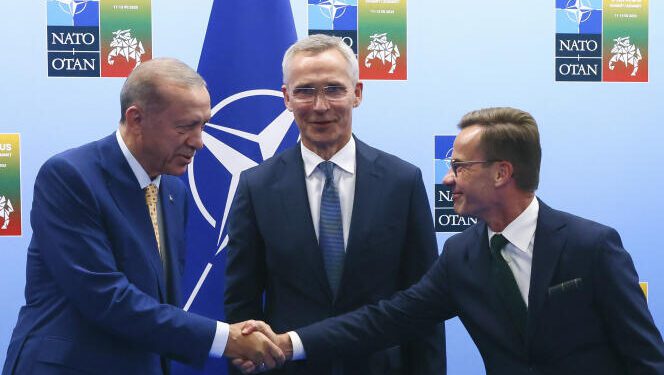In a significant move, the Turkish parliament’s foreign affairs commission has granted approval to Sweden’s NATO membership bid, marking a crucial step in the expansion of the military alliance. The decision comes after 19 months of deliberation and negotiation, during which Ankara sought security-related concessions from Stockholm. The geopolitical backdrop of Russia’s invasion of Ukraine adds urgency and complexity to the accession process.
Key Developments
The decision, made on Tuesday, signals progress in Sweden’s bid to join NATO. Controlled by President Recep Tayyip Erdogan’s ruling Justice and Development Party (AK Party), the commission’s approval paves the way for the next step—a vote by the full parliament. With the AK Party and its allies holding a majority, Sweden’s NATO membership is anticipated to pass this stage. The final step involves President Erdogan’s endorsement, concluding a process that has unfolded over nearly two years, causing frustration among some Western allies.
Commission head Fuat Oktay tempered expectations, emphasizing that the timing for the full Grand National Assembly’s vote would be decided by the speaker. The parliamentary recess in early January may further impact the timeline. Oktay cautioned against interpreting the commission’s decision as a guarantee of swift approval in the general assembly.
Reaction from Sweden and NATO
Swedish Foreign Minister Tobias Billstrom welcomed the commission’s approval, expressing eagerness for Sweden to join NATO. NATO Secretary-General Jens Stoltenberg also applauded the Turkish parliamentary commission’s decision, urging Turkey and Hungary, another holdout, to complete their ratifications promptly. All NATO members, numbering 31, must endorse new memberships.
Turkey’s Previous Objections and Conditions
In May of the previous year, Erdogan raised objections to both Sweden and Finland’s NATO bids, citing concerns about their alleged support for individuals Turkey accuses of being “terrorists” and their defense of trade embargoes. While Turkey ratified Finland’s bid in April, it withheld approval for Sweden until the latter took steps to address Ankara’s concerns. This included cracking down on local members of the Kurdistan Workers’ Party (PKK), designated as a terrorist group by Turkey, the European Union, and the United States.
Sweden responded by introducing legislation making membership in a “terrorist organization” illegal. Additionally, Sweden and other NATO members, including Finland, Canada, and the Netherlands, adjusted arms-export policies impacting Turkey.
Erdogan’s Linkage and Recent Developments
Erdogan had previously linked Turkey’s ratification of Sweden’s NATO membership with the U.S. approval of F-16 fighter jet sales to Turkey. Following a call with U.S. President Joe Biden, Erdogan stated that Washington was considering the ratification in connection with the request.
The Turkish parliament’s foreign affairs commission’s approval of Sweden’s NATO bid represents a notable step forward in a complex diplomatic process. Against the backdrop of Russia’s actions in Ukraine and geopolitical considerations, the final steps, including the parliamentary vote and Erdogan’s endorsement, will shape the future dynamics of Sweden’s NATO membership and Turkey’s role in the alliance.
















